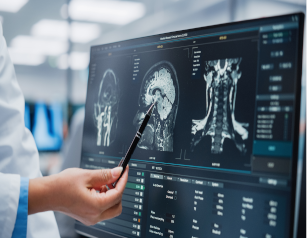
Intervention area: Complementary National Plan Investment I.1
Complementarity with the NRRP: Mission 4 - Component 2
Duration: the project will end on 15/12/2026
Total project funding: €124,000,000
Proposer: Alma Mater Studiorum - Università di Bologna
Project objectives
The DARE project aims to help the Italian health service move decisively from an approach based almost exclusively on diagnosis and treatment to one in which prevention and a community approach play a primary role. To foster such a change of mindset, the project will promote and test the possible contribution of digital technologies, starting with Artificial Intelligence and Big Data, in the search for appropriate, mature, sustainable and scalable solutions to support health promotion and prevention at every stage of citizens' lives.
Project structure and participation
Consortium Members
Universities and research institutes
- Alma Mater Studiorum - Università di Bologna
- Istituto Nazionale di Fisica Nucleare (National Institute of Nuclear Physics)
- Università Cattolica del Sacro Cuore
- Università degli Studi di Palermo
- Università degli Studi di Bari "Aldo Moro"
- Università degli Studi di Parma
- Università degli Studi di Roma Tor Vergata
- Azienda Unità Sanitaria Locale della Romagna (Romagna Local Health Authority)
- Azienda Unità Sanitaria Locale di Bari (Bari Local Health Authority)
- Università degli Studi di Padova
- IRCCS Rizzoli Orthopaedic Institute
- IRCCS University Hospital of Bologna – Policlinico Sant’Orsola
- Fondazione Policlinico Universitario Gemelli IRCCS
- Istituto Tumori Bari “Giovanni Paolo II” IRCCS
- Azienda Ospedale - Università Padova
- Policlinico Tor Vergata
- Azienda Unità Sanitaria Locale di Bologna (Bologna Local Health Authority) – IRCCS Istituto delle Scienze Neurologiche (Institute of Neurological Sciences)
- Libera Università degli Studi di Enna “Kore”
- Azienda Sanitaria Locale Roma 1 (Rome 1 Local Health Authority)
- Regional Agency for Environmental Protection - Sicily
- Azienda Ospedaliero Universitaria Policlinico 'G. Rodolico - San Marco' University Hospital
Private actors
- BI-REX - Big Data Innovation & Research Excellence
- Exprivia S.p.A.
- Engineering Ingegneria Informatica S.p.A.
- Leithà S.r.l.
- GIMBE - Euro-Mediterranean Center on Climate Change
- Maria Cecilia Hospital S.p.A.
- University of Pittsburgh Medical Center Italy S.r.l.
Areas of action
- Spoke 1 – Enabling Factors and Technologies for a Lifelong Digital Prevention (leader: Alma Mater Studiorum - Università di Bologna)
- Spoke 2 – Community-based Digital Primary Prevention (leader: Università degli Studi di Palermo)
- Spoke 3 – Digitally-enabled Secondary and Tertiary Prevention (leader: Università degli Studi di Roma "Tor Vergata")
The University of Bologna participates in: Spoke 1 (leader), Spoke 2.
Project team
University of Bologna team
Scientific coordinator
Prof. Lorenzo Chiari
Teaching and research staff
- Giovanni Barbara
- Paolo Boffetta
- Silvia Cagnone
- Antonella Carbonaro
- Valerio Carelli
- Gastone Castellani
- Federico Chesani
- Lorenzo Chiari
- Monica Chiogna
- Cristiana Corsi
- Luca Cristofolini
- Stefano Diciotti
- Marco Domenicali
- Giusella Finocchiaro
- Gianluca Fiorentini
- Simone Furini
- Elisabetta Lalumera
- Matteo Lippi Bruni
- Antonello Lorenzini
- Mauro Mangia
- Sabato Mellone
- Rossella Miglio
- Angela Montanari
- Maria Chiara Pelleri
- Elisabetta Poluzzi
- Saverio Ranciati
- Matilde Ratti
- Daniel Remondini
- Luigi Ricciardiello
- Claudio Sartori
- Alessandro Silvani
- Rita Stagni
- Pierluigi Strippoli
- Rossella Verzulli
- Marco Viceconti
Staff hired with project funds
Researchers
- Francesca Antonaros
- Davide Borra
- Monia Donati
- Francesco Durazzi
- Adelajda Matuka
- Serena Moscato
- Pierpaolo Palumbo
- Edoardo Redivo
- Anna Vesely
Research fellows
- Marco Amato
- Szilvia Szerena Barath
- Eugenio Cannovale Palermo
- Christian D'Errico
- Francesco Ellia
- Giacomo Frisoni
- Giulia Massimino
- Luca Ragazzi
- Sara Silvestri
- Giada Trisolini
PhD students
- Daniela Bruno
- Francesca Conte
- Andrei Cosmin Siea
- Ilaria D'Ascanio
- Paola Di Florio
- Marco Liotta
- Stefano Vertullo
Departments involved
- Department of Electrical, Electronic, and Information Engineering "Guglielmo Marconi” - DEI
- Department of Biomedical and Neuromotor Sciences - DIBINEM
- Department of Physics and Astronomy "Augusto Righi" – DIFA
- Department of Medical and Surgical Sciences - DIMEC
- Department of Industrial Engineering - DIN
- Department of Computer Science and Engineering – DISI
- Department of Economics - DSE
- Department of Legal Studies - DSG
- Department for Life Quality Studies – QUVI
- Department of Statistical Sciences "Paolo Fortunati" – STAT
Thanks to the project, university research teams have:
- developed a pathway for innovation and evaluation of prevention technologies
- implemented an IT infrastructure that guarantees the privacy of sensitive data used for research
- started a clinical trial in Bologna and Romagna with a 'digital twin' that predicts the risk of falls and hip fractures in frail elderly people
- prepared guidelines for ethics committees in the use of digital tools in clinical trials
- identified experts for 66 pilot trials on healthy and sick citizens
- launched 'twin' projects of technological, ethical-legal, health and organisational innovation for 34 pilot projects
- identified, systematised and promoted training activities to respond to the huge need for digital skills in the health sector
Digital tools at the service of prevention
The selected research teams are continuing their work on:
- analysis of factors that may influence people's health status and well-being: from individual lifestyles to broader determinants of health, using digital tools for accurate risk assessment and implementation of customised interventions for prevention and health promotion
- definition of 'twin' development projects that provide the technological, ethical-legal, health and organisational innovations necessary for these trials to effectively implement the proposed prevention studies
